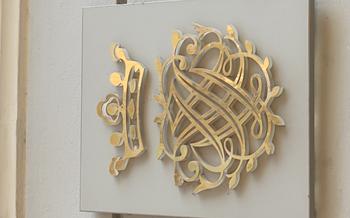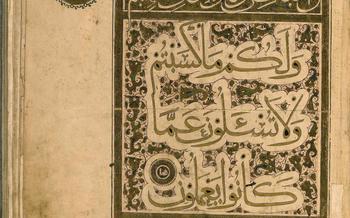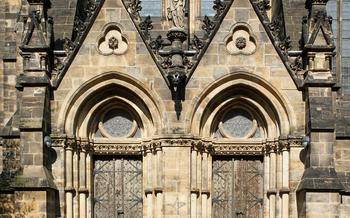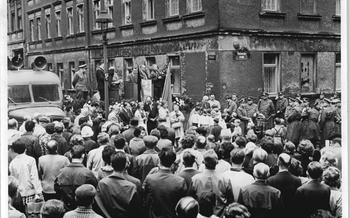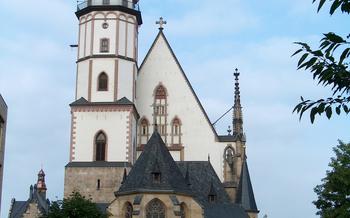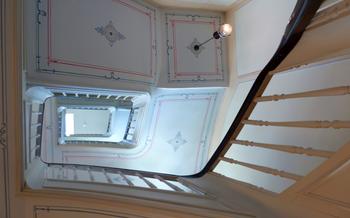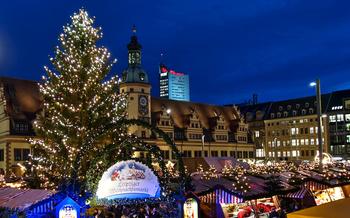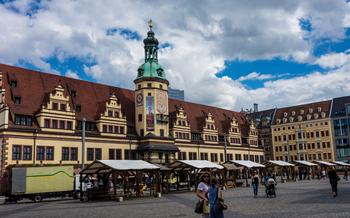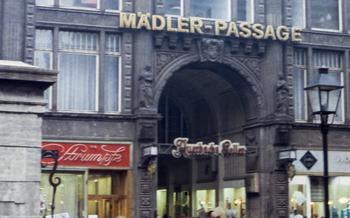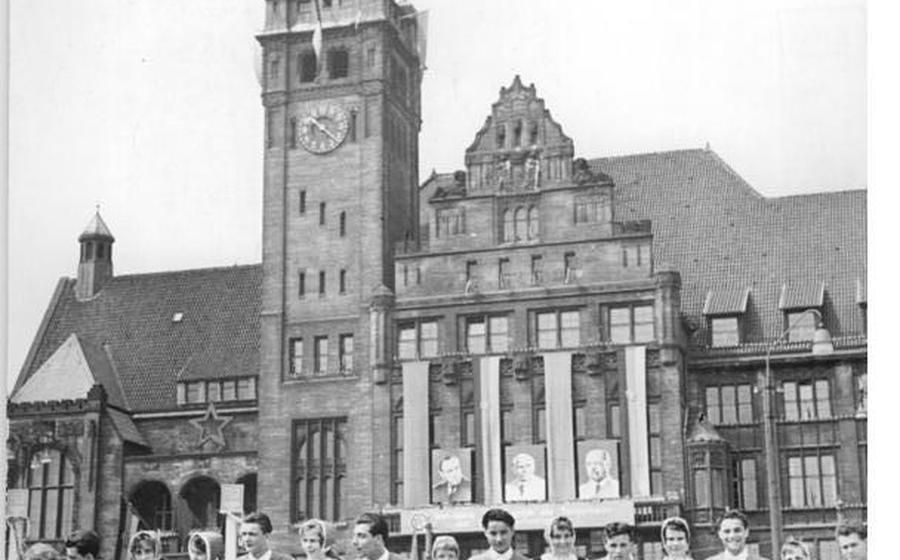
Bach Museum Leipzig
- A musical pilgrimage to Leipzig
- Exploring the Bach Museum Leipzig
- Unveiling Bach's life and work
- Immerse yourself in Bach's music
- Discover Bach's Leipzig
- Bach's Influence on Leipzig's Musical Landscape
- Bach's Legacy in Contemporary Music
- Leipzig's musical heritage beyond Bach
- Accommodation and dining options near the Bach Museum Leipzig
- Getting Around Leipzig
- Other attractions in Leipzig
- Events and festivals in Leipzig
- Leipzig's Shopping Scene
- Insider Tip
A musical pilgrimage to Leipzig
Leipzig, a vibrant city in eastern Germany, holds a special place in the hearts of music lovers worldwide as the home of Johann Sebastian Bach, one of the most influential composers in Western music history. Bach's presence in Leipzig spanned nearly three decades, leaving an indelible mark on the city's musical landscape. His legacy continues to shape Leipzig's cultural identity, making it a must-visit destination for music enthusiasts embarking on a musical pilgrimage.
Bach's arrival in Leipzig in 1723 marked a new chapter in his illustrious career. As cantor of the Thomaskirche, he composed some of his most iconic works, including the "St. Matthew Passion" and the "Mass in B Minor." His profound understanding of counterpoint, harmony, and melody revolutionized baroque music, captivating audiences with its emotional depth and technical brilliance.
Leipzig, under Bach's influence, blossomed into a thriving center of musical innovation. His compositions not only enriched the city's musical heritage but also inspired a new generation of musicians. His legacy extends far beyond his lifetime, as Leipzig remains a vibrant hub of musical activity, hosting prestigious orchestras, opera companies, and music festivals, all paying homage to the great master.
Exploring the Bach Museum Leipzig
Conveniently situated in the heart of Leipzig, the Bach Museum Leipzig is an immersive journey into the life and work of Johann Sebastian Bach. Easily accessible by public transportation or on foot, the museum offers a comprehensive exploration of Bach's legacy through its captivating exhibits and educational programs.
Upon entering the museum, visitors are greeted by a stunning collection of Bach-related artifacts, including original manuscripts, instruments, portraits, and personal belongings. Interactive displays bring Bach's music to life, allowing visitors to experience his compositions from a new perspective. Engaging multimedia presentations delve into the historical context of Bach's time, shedding light on his influences and the musical landscape of 18th-century Leipzig.
The Bach Museum Leipzig also offers a variety of educational programs, workshops, and concerts throughout the year. Visitors can attend lectures by renowned Bach scholars, participate in hands-on workshops on Bach's music, or simply relax and enjoy a live performance of Bach's works in the museum's concert hall.
Unveiling Bach's life and work
Johann Sebastian Bach, born in Eisenach in 1685, displayed an extraordinary musical talent from a young age. He received his early musical training from his father, Johann Ambrosius Bach, a violinist and town musician. Bach's musical education continued under the tutelage of his elder brother, Johann Christoph Bach, who was the organist at the Michaeliskirche in Ohrdruf.
Bach's formal music education culminated with his enrollment at the prestigious St. Thomas School in Leipzig. Here, he honed his skills as a keyboard player and composer under the guidance of Johann Kuhnau, the school's cantor. Bach's remarkable abilities as an organist and composer soon gained recognition, leading to his appointment as the organist of the New Church in Arnstadt in 170
Throughout his illustrious career, Bach held various positions as an organist, court composer, and Kapellmeister in Weimar, Köthen, and Leipzig. His prolific output during this period encompassed a vast array of musical genres, including cantatas, motets, concertos, and organ works. Bach's music is renowned for its intricate counterpoint, expressive harmonies, and profound emotional depth.
Immerse yourself in Bach's music
Leipzig is a city that breathes music, and Bach's legacy is omnipresent. There are numerous ways to immerse yourself in the composer's music during your visit.
-
Attend a concert at the Bach Museum Leipzig: The museum's concert hall hosts regular performances of Bach's music by renowned musicians and ensembles. These concerts offer a unique opportunity to experience Bach's music in an intimate setting, surrounded by artifacts related to his life and work.
-
Listen to Bach's music in the city's churches: Many of Leipzig's churches, including the Thomaskirche where Bach served as cantor, regularly hold concerts and services featuring Bach's music. These performances often take place in the same spaces where Bach's music was first performed centuries ago, creating a truly immersive experience.
-
Experience the annual Bachfest Leipzig: Held every year in June, the Bachfest Leipzig is one of the world's most prestigious festivals dedicated to the composer's music. The festival features a wide range of concerts, exhibitions, workshops, and other events, attracting musicians and music lovers from around the globe.
Discover Bach's Leipzig
Thomaskirche: Bach's Musical Home In the heart of Leipzig, the Thomaskirche stands as a testament to Bach's profound impact on the city. Here, Bach served as cantor for 27 years, composing and directing some of his most renowned works, including the "St. Matthew Passion" and the "Mass in B Minor." The church's interior is adorned with intricate carvings and a grand organ, perpetuating the legacy of Bach's musical genius. Take a guided tour to delve into the history of this iconic church and witness the pulpit where Bach delivered his sermons.
Bach-Archiv Leipzig: A Treasure Trove of Bach's Heritage Leipzig's dedication to Bach's legacy extends beyond the Thomaskirche. The Bach-Archiv Leipzig, a world-renowned research center, houses a vast collection of Bach's manuscripts, letters, and personal effects. Immerse yourself in the life and work of this musical master as you explore the exhibits, which include original scores, rare editions, and fascinating insights into Bach's creative process. The Bach-Archiv also hosts concerts, lectures, and workshops, providing a platform for scholars and enthusiasts to delve deeper into Bach's music and its enduring influence.
Tracing Bach's Footsteps Leipzig offers a unique opportunity to retrace the footsteps of Bach, exploring the places where he lived, worked, and found inspiration. Wander through the streets of the Old Town, where Bach's former homes and haunts still stand. Visit the Nikolaikirche, where he was baptized, and the Peterskirche, where he performed as a young musician. Each location unveils another layer of Bach's life, allowing you to connect with the man behind the music.
Bach's Influence on Leipzig's Musical Landscape
Johann Sebastian Bach's profound impact on Leipzig's musical landscape is still palpable today. The city is home to several prestigious musical institutions that bear witness to Bach's legacy. The Gewandhaus Orchestra, founded in 1743, is one of the world's leading orchestras and has a long history of performing Bach's works. The Leipzig Opera, renowned for its productions of Bach's operas, is another important institution that carries on Bach's musical tradition.
Additionally, the Hochschule für Musik und Theater "Felix Mendelssohn Bartholdy", a prestigious music school, attracts talented musicians from around the world who come to study and perform Bach's music. These institutions, along with the Bach Museum Leipzig, contribute to Leipzig's reputation as a vibrant and dynamic musical center, where Bach's legacy continues to inspire and influence musicians and music lovers alike.
Bach's Legacy in Contemporary Music
Johann Sebastian Bach's music continues to exert a profound influence on contemporary music, inspiring and challenging composers across genres. His innovative techniques, such as counterpoint, fugue, and chromaticism, have become essential elements of Western musical tradition.
Many modern composers have directly referenced or adapted Bach's works in their own compositions. For example, the renowned American composer Leonard Bernstein incorporated Bach's music into his "Mass: A Theatre Piece" (1971), creating a powerful dialogue between the Baroque and 20th-century musical styles.
Bach's influence is also evident in the works of minimalist composers such as Philip Glass and Steve Reich. Glass's repetitive patterns and intricate structures echo Bach's fugal writing, while Reich's use of phasing and polyrhythms recalls Bach's complex counterpoint.
Even in popular music, Bach's legacy can be felt. The Beatles, one of the most influential rock bands of all time, drew inspiration from Bach's music, incorporating elements of his harmonies and melodies into their own songs.
In addition to direct references and adaptations, Bach's music has also inspired contemporary composers to explore new directions and push the boundaries of musical expression. His emphasis on structure, clarity, and emotional depth has challenged composers to create works that are both intellectually stimulating and emotionally resonant.
Through his enduring influence on composers of all eras, Bach's music continues to shape the evolution of contemporary music, ensuring his legacy as one of the most significant and influential figures in the history of Western music.
Leipzig's musical heritage beyond Bach
Leipzig's musical heritage extends far beyond the towering figure of Johann Sebastian Bach. The city has been a hub of musical activity for centuries, nurturing the talents of numerous renowned composers, performers, and music educators.
Felix Mendelssohn Bartholdy, one of the most celebrated composers of the Romantic era, was born in Leipzig in 180His compositions, including the oratorio "Elijah" and the "Italian" Symphony, continue to be performed worldwide. Robert Schumann, another Romantic composer, also had strong ties to Leipzig. He served as the city's music director from 1843 to 1844 and founded the Leipzig Conservatory, which later became the Hochschule für Musik und Theater "Felix Mendelssohn Bartholdy."
Leipzig's rich musical history is also reflected in its role as a center of music publishing and instrument making. Breitkopf & Härtel, one of the world's oldest music publishing houses, was founded in Leipzig in 171The company has published works by Bach, Beethoven, Mozart, and many other notable composers. Leipzig was also home to several renowned instrument makers, including the piano manufacturer C. Bechstein and the violin maker Hermann Ritter.
Today, Leipzig's musical heritage continues to thrive. The city is home to a vibrant music scene, with a diverse range of concerts and festivals taking place throughout the year. The Gewandhaus Orchestra, founded in 1781, is one of the world's leading orchestras and is renowned for its performances of Bach's music. The Leipzig Opera, founded in 1693, is another important cultural institution, staging both classical and contemporary operas, including works by Bach.
Accommodation and dining options near the Bach Museum Leipzig
When visiting the Bach Museum Leipzig, you'll have a variety of accommodation and dining options to choose from. For a truly immersive experience, consider staying at the Hotel Fürstenhof, a historic hotel located just steps away from the museum. The hotel offers elegant rooms and suites, many of which overlook the Thomaskirche, where Bach served as cantor.
For a more budget-friendly option, the Jugendherberge Leipzig is a popular choice among travelers. The hostel is located a short walk from the Bach Museum and offers basic but comfortable rooms.
No matter where you choose to stay, you'll find plenty of dining options nearby. For a taste of traditional German cuisine, try Auerbachs Keller, a historic restaurant that has been serving guests since the 16th century. The restaurant is known for its hearty dishes, such as roast pork and dumplings, and its cozy atmosphere.
If you're looking for something more modern, try the Restaurant Falco, which offers a creative menu of seasonal dishes. The restaurant is located in the trendy Südvorstadt district, which is known for its lively nightlife.
Whether you're looking for a luxurious stay or a budget-friendly option, you'll find plenty of accommodation and dining options near the Bach Museum Leipzig to suit your needs.
Getting Around Leipzig
Leipzig offers a variety of convenient transportation options, making it easy to navigate the city and explore its many attractions. The public transportation system, operated by the Leipziger Verkehrsbetriebe (LVB), includes an extensive network of trams and buses that connect all parts of the city. Trams are particularly efficient for getting around, as they run frequently and have dedicated lanes, allowing them to avoid traffic congestion. Buses, on the other hand, are more comprehensive and reach areas that may not be accessible by tram. Taxis are also readily available, providing a comfortable and convenient option for those who prefer not to use public transportation.
For those who enjoy exploring on two wheels, Leipzig offers a well-developed cycling infrastructure with designated bike lanes and paths throughout the city. Renting a bicycle is a great way to see the sights at your own pace and enjoy the city's many green spaces. Walking tours and guided excursions are also popular options for visitors who want to learn more about Leipzig's history and culture. These tours often cover the city's main attractions, such as the Bach Museum Leipzig, the Thomaskirche, and the Gewandhaus, and provide insights into the city's rich musical heritage.
Other attractions in Leipzig
In addition to its rich musical heritage, Leipzig offers a diverse range of other attractions to explore. For a glimpse into the city's natural wonders, visit the Leipzig Zoo, home to a wide variety of animals from around the world, including lions, tigers, elephants, and giraffes. History buffs can immerse themselves in the past at the Panometer Leipzig, a unique 360-degree panorama that showcases historical events such as the Battle of Leipzig and the fall of the Berlin Wall. To pay homage to the city's role in German history, climb to the top of the Völkerschlachtdenkmal, a towering monument that commemorates the Battle of Leipzig, one of the largest battles in European history.
Events and festivals in Leipzig
Leipzig is renowned for its vibrant cultural scene, and its festivals and events play a significant role in attracting visitors from around the world. Among the most notable events is the annual Bachfest Leipzig, a celebration of Bach's music that takes place every June. The festival features a diverse program of concerts, exhibitions, and workshops, attracting renowned musicians and music enthusiasts alike.
Another popular event is the Wave-Gotik-Treffen, a festival dedicated to Gothic music and culture. Held annually in May, the festival draws thousands of fans from across Europe and beyond. The festival features a variety of events, including concerts, parties, and exhibitions, showcasing the latest trends in Gothic music and fashion.
In addition to these major events, Leipzig hosts a variety of other cultural festivals throughout the year. These include the Leipzig Book Fair, one of the largest book fairs in Germany; the Leipzig Mozart Festival, celebrating the music of Wolfgang Amadeus Mozart; and the Leipzig Jazz Festival, showcasing a diverse range of jazz musicians from around the world.
Whether you're a fan of classical music, Gothic culture, or contemporary art, Leipzig's festivals and events offer something for everyone. Be sure to check the city's event calendar before your visit to plan your itinerary accordingly.
Leipzig's Shopping Scene
Leipzig offers a diverse shopping experience, catering to various tastes and budgets. Whether you seek unique souvenirs, high-end fashion, or local delicacies, the city has something to offer.
Stroll through the historic Mädlerpassage, a charming shopping arcade dating back to the 19th century. Here, you'll find an array of boutiques, specialty stores, and cafes housed in beautifully preserved buildings. Browse for antiques, handcrafted jewelry, designer clothing, and more.
For a modern shopping experience, head to the Höfe am Brühl, a sleek shopping center located in the heart of the city. This mall features a mix of international brands, local boutiques, and restaurants. From fashion and accessories to electronics and home goods, you're sure to find something to your liking.
Take advantage of Leipzig's central location to explore the surrounding shopping districts. The Petersbogen, located near the main train station, offers a mix of shops, restaurants, and a cinema. The Karstadt department store is another popular destination for shoppers, with a wide range of products under one roof.
When it comes to souvenirs, Leipzig has plenty to offer. Pick up a Bach-themed souvenir from the Bach Museum Leipzig, or browse the local markets for traditional German handicrafts. Don't forget to sample the city's culinary delights, such as the Leipziger Lerche, a sweet pastry filled with marzipan and candied fruit.
Whether you're looking for a unique gift, a new outfit, or simply a leisurely shopping experience, Leipzig has something to offer every visitor.
Insider Tip
To truly immerse yourself in the world of Bach without the hustle and bustle of peak tourist season, consider visiting the Bach Museum Leipzig during the off-season, which runs from November to March. During this time, you'll encounter fewer crowds, allowing you toじっくりと explore the museum's exhibits and engage with the staff more personally. The off-season also offers a unique opportunity to experience the city of Leipzig in a quieter and more relaxed state, providing a deeper connection to Bach's legacy and the city's rich musical heritage.
